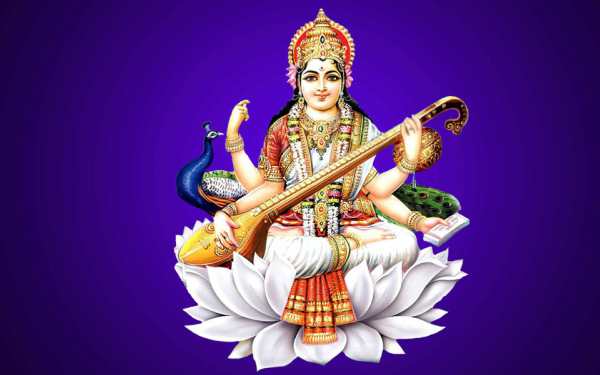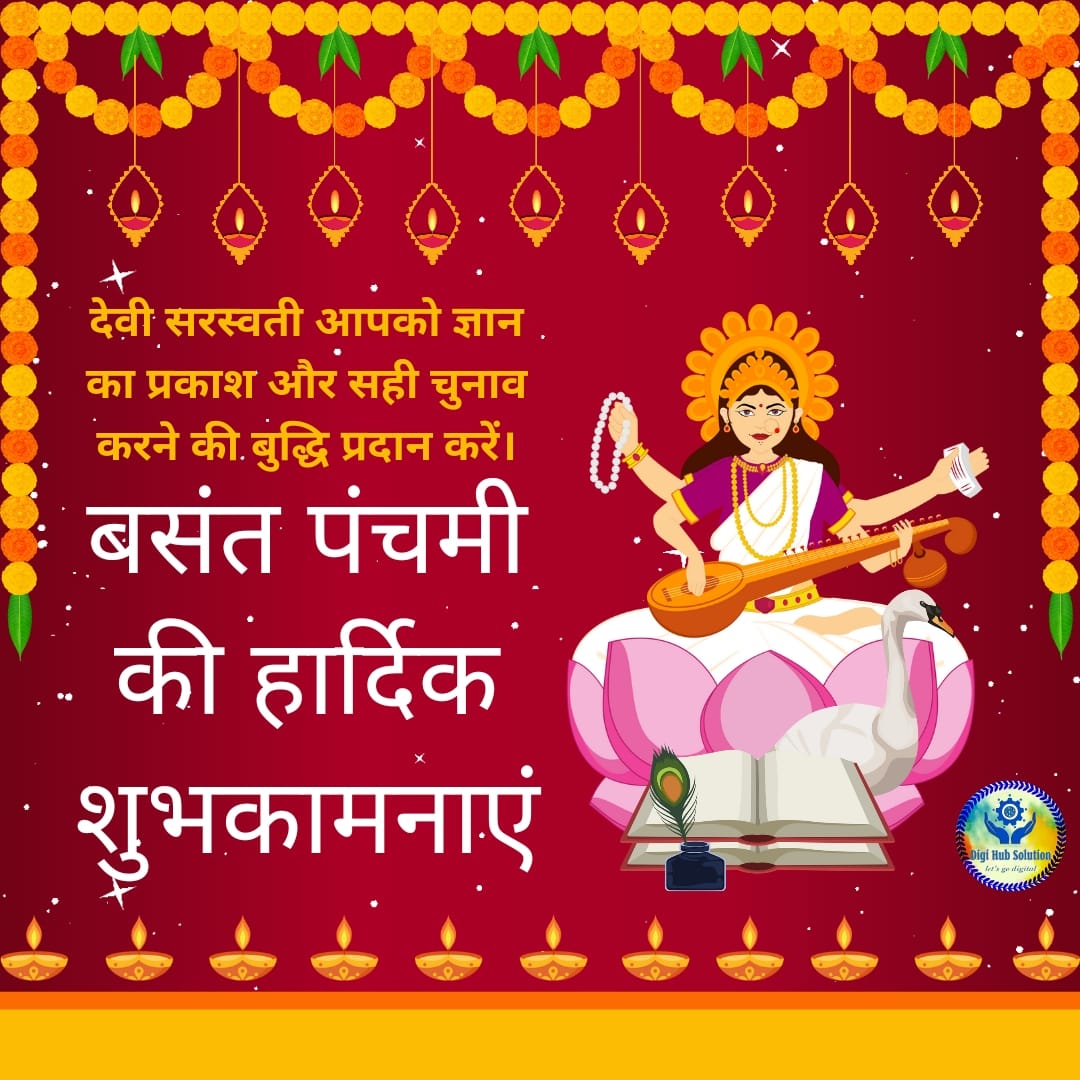Vasant Panchami or Sri Panchami is a Hindu festival. Saraswati, the goddess of knowledge, is worshiped on this day. This puja is celebrated with great enthusiasm in eastern India, northwestern Bangladesh, Nepal and many other countries. Wear yellow clothes on this day. In the scriptures, Basant Panchami has been mentioned as Rishi Panchami, while it is also depicted in different ways in the Puranas, scriptures and many poetic texts.
In ancient India and Nepal, among the six seasons in which the whole year was divided, spring was the most desired season of the people. When spring arrived, mustatd flowers in the fields would start shining like gold, barley and wheat ears would start blooming, mango trees would blossom and colorful butterflies would start hovering everywhere. The whirlwinds started circling incessantly. To welcome the spring season, a big celebration was held on the fifth day of the month of Magha in which Vishnu and kamadeva were worshipped. This was called the festival of Vasant Panchami.
Mythology of Vasant Panchami
When Lord Brahma, the creator of the universe, created man, he felt that something was incomplete and due to lack of something, he took permission from Lord Vishnu and sprinkled water from his kamandalu. Because of this water, amazing changes started taking place in the earth. A strong Mother Saraswati appeared with trembling. Mother was wearing white clothes. She had four arms in which Veda, Veena and one hand were in Vara Mudra. On the request of Brahma ji, Mother Saraswati started playing Veena, as a result of which the whole world got speech. Hui I Mata Saraswati is also known and worshiped by the names of Sharda, Bagishwari, Veenavadani, Bhagwati, and Vagdevi. Mata Saraswati is considered the goddess of knowledge, wisdom and music. The festival of Basant Panchami is celebrated as the birth celebration of Mata Saraswati. Is celebrated.

Vasant Panchami fast, worship method and mantra
According to the Puranas, Goddess Saraswati was first worshiped by Lord Krishna, at that time this tradition is still going on. On this day, one should wake up in Brahma Muhurta. After taking bath etc., one should first worship and meditate on Lord Ganesha at the place of worship without eating anything because The results of any puja are achieved only by worshiping Lord Ganesha first. After that, white flowers, sandalwood, gulal and white clothes should be offered to Mother Saraswati. Aarti should be performed with incense and lamp and then if possible, sound the conch. I After the puja, pay obeisance to the Mother Goddess and express your feelings to her.
Importance of festival
As soon as spring arrives, every part of nature blossoms. Not only humans but even animals and birds are filled with joy. Every day the sun rises with new enthusiasm and goes away with the assurance of coming again the next day after providing new consciousness.

Although this entire month of Magh is encouraging, but the festival of Vasant Panchami (Magh Shukla) affects the Indian life in many ways. Since ancient times, it is considered the birthday of Mother Saraswati, the goddess of knowledge and art. Academicians who love India and Indianness, worship Maa Sharda on this day and pray to her to become more knowledgeable. What to say about the artists The importance that soldiers have for their weapons and Vijayadashami, the scholars have for their books and Vyas Purnima, the traders have their scales, weights, ledgers and Diwali, Vasant Panchami has the same importance for artists. Be they poets or writers, singers or instrumentalists, playwrights or dancers, everyone starts the day with worship of their instruments and worship of Mother Saraswati.
Mythological significance
Along with this, this festival also reminds us of many inspiring events of the past. First of all it connects us to Treta Yuga. After the abduction of Sita by Ravana, Shri Ram moved towars the south in search of her. Dandakaranya was also among the places he visited. A Bheelani named Shabari lived here. When Ram came to her hut, she lost her senses and started feeding the sweet plum to Ram ji after tasting it. All the singers of Ramkatha presented this incident of falling asleep in love in their own way.
That area of Dandakaranya is spread in Gujarat and Madhya Pradesh these days. There is a place in Dang district of Gujarat where Shabari Maa’s ashram was. Ramchandra ji had come there on the day of Vasant Panchami. Even today, the forest dwellers of that area worship a rock, about which they believe that Shri Ram had come and sat here. There is also a temple of Shabari Mata there.

Historical significance
The day of Vasant Panchami also reminds us of Prithviraj Chauhan. He defeated the foreign invader Mahammad Ghori 16 times and showed generosity and left him alive every time, but when he was defeated for the seventeenth time, Mohammad Ghori did not spare him. He took them with him to Afghanistan and gouged out their eyes. The incident after this is world famous. Mahammad Ghori wanted to see the wonders of his speech-piercing arrow before giving him the death penalty. On the advice of Prithviraj’s fellow poet Chandbardai, Ghori gave a signal by sitting on a high place and hitting the pan. Then Chandbardai gave a message to Prithviraj.
chaar baans chaubees gaj, angul asht pramaan.
ta oopar sultaan hai, mat chooko chauhaan .
Prithviraj Chauhan did not make a mistake this time. The arrow he shot, guessing from the injury on the pan and the sign of Chandbardai, hit Mohammad Ghori’s chest. After this, Chandbardai and Prithviraj also sacrificed themselves by stabbing each other in the stomach. (1192 AD) This incident also happened on the day of Vasant Panchami.
The day of Basant Panchami is very important for Sikhs. It is believed that on the day of Basant Pachami, the tenth Guru of the Sikhs, Guru Gobind Singh Ji, was married.
Your wife Fatima, how will you feel What happened next, as soon as Mulla ji came, those mischievous students complained that he had abused Bibi Fatima. Then the matter escalated and reached the Qazi. Under Muslim rule, the same decision was taken which was expected. The order was given that either Haqiqat should become a Muslim, otherwise he would be given death penalty. The reality did not accept this. As a result, an order was issued to put him to death by the sword.
Vasant Panchami also has a deep connection with Veer Haqiqat, a resident of Lahore. One day when Mulla ji left school for some work, all the children started playing, but he continued studying. When other children teased him, he swore by Goddess Durga. Muslim children made fun of Goddess Durga. Haqiqat said if I say something about Your wife Fatima, how will you feel What happened next, as soon as Mulla ji came, those mischievous students complained that he had abused Bibi Fatima. Then the matter escalated and reached the Qazi. Under Muslim rule, the same decision was taken which was expected. The order was given that either Haqiqat should become a Muslim, otherwise he would be given death penalty. The reality did not accept this. As a result, an order was issued to put him to death by the sword.
Vasant Panchami also has a deep connection with Veer Haqiqat, a resident of Lahore. One day when Mulla ji left school for some work, all the children started playing, but he continued studying. When other children teased him, he swore by Goddess Durga. Muslim children made fun of Goddess Durga. Haqiqat said that if I say something about your wife Fatima, how will you feel What happened next, as soon as Mulla ji came, those mischievous student complained that he had abused Bibi Fatima. Then the matter scalated and reached the Qazi. Under Muslim rule, the same decision was taken which was ex
Vasant Panchami also reminds us of Guru Ram Singh Kuka. He was born in 1816 AD on Vasant Panchami in Bhaini village of Ludhiana. He stayed in the army of Maharaja Ranjit Singh for some time, then came home and started farming, but due to his spiritual inclination, people started coming to listen to his sermons. Gradually a separate sect of his disciples was formed, which was called Kuka sect.
Guru Ram Singh laid great emphasis on cow protection, Swadeshi, women’s liberation, inter-caste marriage, mass marriage etc. he was also the first to boycott the British rule and run his own independent postal and administrative system. Every year a fair was held in Bhaini village on Makar Sankranti. While coming to the fair in 1872, one of his disciples was surrounded byMuslims. They beat him, slaughtered the cow and stuffed it in his mouth. Hearing this, Guru Ram Singh’s disciples got angry. They attacked that village, but the British army came from the other side. Hence the fate of the war turned.
In this struggle many Kuka warriors were martyred and 68 were captured. Of these, 50 were made to stand in front of the cannon at Malerkotla and were blown up on 17 January 1872. The remaining 18 were hanged the next day. Two days later, Guru Ram Singh was also arrested and sent to Mondalay jail in Burma. After enduring severe torture there for 14 years, he left his body in 1885 AD.
Birthday
Raja Bhoj’s birthday falls on Vasant Panchami only. Raja Bhoj used to organize a big festival on this day in which a big feast was organized for the entire people which continued for forty days.
Vasant Panchami is also the birthday (28.02.1899) of the immortal great poet of Hindi literature, Suryakant Tripathi ‘Nirala’. Nirala ji had immense love and pain for the poor. He used to give his mony and clothes openly to the poor. For this reason people called him ‘Mahapran’. People born on this day go far if they try.


